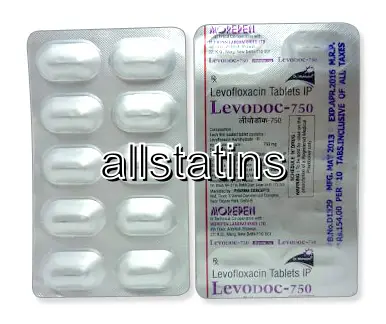| Package | Dosage | Price | Price per Dose | |
|---|---|---|---|---|
| Dosage: 250mg | ||||
| 360 pill | 250mg | $548.95 | $1.52 | |
| 240 pill | 250mg | $378.52 | $1.58 | |
| 180 pill | 250mg | $299.58 | $1.67 | |
| 120 pill | 250mg | $215.26 | $1.79 | |
| 90 pill | 250mg | $174.00 | $1.94 | |
| 60 pill | 250mg | $127.36 | $2.13 | |
| 30 pill | 250mg | $73.54 | $2.46 | |
| Dosage: 500mg | ||||
| 360 pill | 500mg | $787.55 | $2.19 | |
| 180 pill | 500mg | $410.81 | $2.28 | |
| 120 pill | 500mg | $287.02 | $2.39 | |
| 90 pill | 500mg | $226.03 | $2.51 | |
| 60 pill | 500mg | $157.85 | $2.64 | |
| 30 pill | 500mg | $82.51 | $2.76 | |
| Dosage: 750mg | ||||
| 180 pill | 750mg | $609.94 | $3.39 | |
| 120 pill | 750mg | $428.75 | $3.57 | |
| 90 pill | 750mg | $337.25 | $3.75 | |
| 60 pill | 750mg | $235.00 | $3.93 | |
| 30 pill | 750mg | $123.77 | $4.13 | |

Levaquin Description
What is Levaquin?
Levaquin, known generically as levofloxacin, is an antibiotic medication frequently prescribed in the United States to treat a variety of bacterial infections. It belongs to the fluoroquinolone class of drugs, which work by eliminating bacteria that cause illnesses. Whether dealing with respiratory infections, urinary tract infections, or skin infections, Levaquin is often considered an effective treatment option. It is available by prescription through pharmacies in the USA, and many patients appreciate its broad-spectrum activity. It is important to remember that Levaquin only treats bacterial infections and is ineffective against viruses like the common cold or flu.
How Does Levaquin Work?
Levaquin works by inhibiting the bacterial DNA topoisomerase IV and DNA gyrase enzymes. By blocking these enzymes, the medication prevents bacteria from replicating their DNA, which ultimately leads to their death. This mechanism helps quickly reduce the bacterial load in the affected areas, leading to symptom relief. The medication is usually prescribed for a course that can range from a few days to several weeks, depending on the type and severity of the infection. It is most effective when taken as directed by your healthcare provider.
Usage and Dosage
In the US, Levaquin is typically provided in tablet form, with dosages varying depending on the infection. Commonly, a daily dose of 250 mg, 500 mg, or 750 mg is prescribed. Patients should follow their healthcare provider’s instructions carefully. It is usually taken once daily, with or without food. It's important to complete the entire course of treatment, even if symptoms improve before completion. Skipping doses or stopping early can lead to antibiotic resistance or a return of infection. Always inform your doctor about other medications you are taking to avoid potential drug interactions.
Potential Side Effects and Precautions
Like all antibiotics, Levaquin carries the risk of side effects. Common ones include nausea, diarrhea, headache, and insomnia. Serious but less common side effects may involve tendinitis, tendon rupture, nerve damage, or central nervous system effects. Because fluoroquinolones can affect the tendons, patients over 60, those on corticosteroids, or with pre-existing health problems should be cautious. It is also essential to inform your healthcare provider if you have a history of seizures or a diagnosis of a neurological disorder.
Is Levaquin Suitable for Everyone?
While Levaquin is effective for many bacterial infections, it is not suitable for everyone. Pregnant women, breastfeeding mothers, and children under 18 are usually advised to avoid it unless specifically prescribed by a healthcare professional. Patients with a history of allergies to fluoroquinolones should inform their doctor. Additionally, individuals taking other medications or with certain health conditions should discuss their situation with their doctor to ensure safe usage. Your healthcare provider will evaluate your health profile before recommending Levaquin as a treatment option.
Conclusion
Levaquin is a well-established antibiotic used in the USA to treat various bacterial infections. Its broad-spectrum activity makes it a valuable choice in many clinical situations. However, like all antibiotics, it must be used responsibly to prevent resistance and minimize adverse effects. If your healthcare provider prescribes Levaquin, ensure that you follow their instructions precisely and report any side effects promptly. Proper use helps achieve the best outcomes and supports your recovery from bacterial infections.